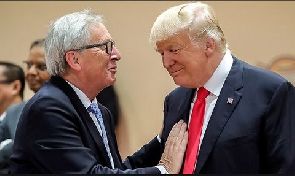The European Union has delivered a stern warning to the US over a plan to impose new sanctions on Russia, opening up the prospect of a rift between the two allies over how to deal with Moscow’s foreign interventions.
EU President Jean-Claude Juncker said the bloc would act “within days” if it does not receive reassurances on the potential impact of new sanctions on European interests.
Russia also reacted angrily, saying the sanctions bill passed by the US House of Representatives on Tuesday risked worsening the already poor relations between the two countries.
The bill, drawn up largely in response to Moscow’s alleged meddling in the 2016 US election, calls for new measures against Russia, North Korea and Iran. It also limits any effort by the White House to weaken such penalties.
But the EU fears the sanctions could hit companies that are involved in the financing of a controversial new pipeline, Nord Stream 2, that would carry natural gas from Russia to Germany.
Juncker said the bill could have “unintended unilateral effects” on the EU’s energy security.
“This is why the Commission concluded today that if our concerns are not taken into account sufficiently, we stand ready to act appropriately within a matter of days,” Juncker said. “America first cannot mean that Europe’s interests come last.”
Germany, which strongly backs the new pipeline, said it was concerned over the sanctions. It would be “unacceptable for the United States to use possible sanctions as an instrument to serve the interests of US industry policies,” Foreign Ministry spokesman Martin Schäfer said Wednesday.
If the bill clears a vote in the US Senate, it then heads to the desk of US President Donald Trump. It is not clear if that will happen before Congress breaks for summer recess at the end of the month.
Trump has not indicated whether he will sign the bill, which also gives Congress a way to block any easing of new sanctions against Russia, North Korea and Iran, as well as older ones against Russia.
The House action came hours after Jared Kushner, the President’s son-in-law and senior adviser, was interviewed by the House Intelligence Committee about the 2016 campaign and allegations that the Trump campaign coordinated with Russian officials to help defeat his opponent, Hillary Clinton.
Trump’s presidency has been dogged by questions his campaign’s ties with Russia and his pre-election promises to improve relations with Moscow.
The Trump administration and the Russian government have consistently denied collusion.








